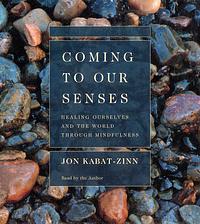You need to sign in or sign up before continuing.
Take a photo of a barcode or cover
This was a long yet important and useful read. At 609 pages (not including references, suggested reading, and index!), it felt like I was reading some sort of Bible-equivalent for mindfulness. At this point in my mindfulness journey, it was perfect. I wouldn't really recommend it to a newbie just for the potential of burnout. I think his "Wherever You Go, There You Are" is a much better intro.
The last 100 pages or so dealt with politics and how much our world leaders could use mindfulness and solve a lot of big problems. This was published in 2005 but especially after our recent election this seemed quite relevant. However, it did take me out of it a bit. It almost felt like a second mini-book to the rest of the book.
I was struck at the beginning of how long his sentences are and how much he loves commas. It was downright distracting at first and near the end. Editors, wtf?
The last 100 pages or so dealt with politics and how much our world leaders could use mindfulness and solve a lot of big problems. This was published in 2005 but especially after our recent election this seemed quite relevant. However, it did take me out of it a bit. It almost felt like a second mini-book to the rest of the book.
I was struck at the beginning of how long his sentences are and how much he loves commas. It was downright distracting at first and near the end. Editors, wtf?
I gave this one the old college try, but it's just not working for me. I actually think it's a fine book, with some really insightful gems, like the excellent and succinct description of Buddhism in the "Dharma" chapter and this passage about individual experience:
That passage in particular has caused a small but significant shift in how I look at the world. The trouble is that Kabat-Zinn uses an awful lot of words. There's a lot to read between the gems, and I find myself getting...bored. Perhaps part of this is because I've already read Full Catastrophe Living, and I've not found much that's particularly new in Coming to Our Senses. Or it could just be that I'm not in a nonfiction mood or that I really just want to "do" mindfulness rather than read about it right now. Whatever it is, I'm going to read the section on healing the body politic, and maybe jump here and there, but when I go to library day after tomorrow, I'm going to be taking this one back, no matter how much I've left unread.
"Since awareness at first blush seems to be a subjective experience, it is hard for us not to think that we are the subject, the thinker, the feeler, the seer, the doer and as such, the very center of the universe, the very center of the field of our awareness. Perceiving thus, we take everything in the universe, or at least our universe, quite personally." (169)
That passage in particular has caused a small but significant shift in how I look at the world. The trouble is that Kabat-Zinn uses an awful lot of words. There's a lot to read between the gems, and I find myself getting...bored. Perhaps part of this is because I've already read Full Catastrophe Living, and I've not found much that's particularly new in Coming to Our Senses. Or it could just be that I'm not in a nonfiction mood or that I really just want to "do" mindfulness rather than read about it right now. Whatever it is, I'm going to read the section on healing the body politic, and maybe jump here and there, but when I go to library day after tomorrow, I'm going to be taking this one back, no matter how much I've left unread.
Mindfulness leader Jon Kabat-Zinn explores the ways mindfulness helps one's physical and mental health.



